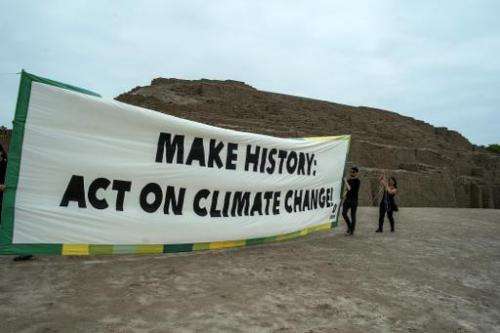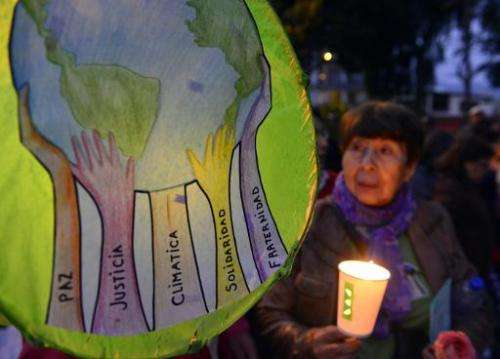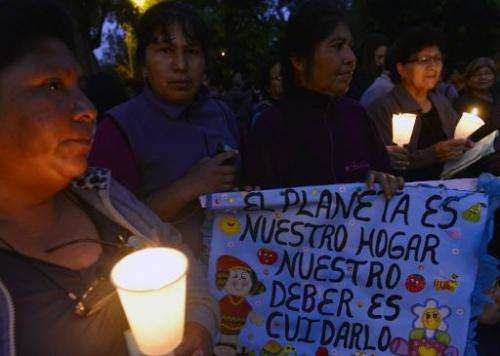Members of Oxfam international organization hold a banner at the archaeological site of Huaca Pucllana in Lima on November 29, 2014, ahead of COP20 and CMP10
The world's nations gather in the Peruvian capital Lima on Monday in a renewed push for a historic deal to roll back carbon emissions threatening future generations.
The 12-day talks under the UN Framework Convention on Climate Change (UNFCCC) take place amid grim scientific warnings but also revived political interest in sealing a pact in Paris in December 2015.
"Never before have the risks of climate change been so obvious and the impacts so visible. Never before have we seen such a desire at all levels of society to take climate action," UNFCCC chief Christiana Figueres said.
"Never before has society had all the smart policy and technology resources to curb greenhouse gas emissions and build resilience."
Since September, top-level interest has taken the climate issue out of the back room where it was consigned after a near-fiasco at a summit in Copenhagen in 2009.
In September, UN Secretary General Ban Ki-moon coaxed world leaders into renewing their vows to fight the scourge.
Since then, the three biggest emitters—China, the United States and Europe—have sketched their own plans for contributing to the carbon cleanup
Woefully short
But the Lima talks must clear several hurdles.
They must agree on a clear and transparent way by which countries next year will report national pledges to reduce climate-damaging greenhouse gases.
People attend a candlelight vigil organized by the Interfaith Council of Peru at a park in Lima, on November 30, 2014, before the opening of Climate Change Conference hosted by the government of Peru
Without this cornerstone of trust, the voluntary approach that became the UNFCCC's strategy after Copenhagen could founder.
The UNFCCC's 196 parties must also hammer out a workable negotiating text for next year—a draft that is still likely to have big gaps, such as the accord's legal status and how pledges should be policed.
The envisioned 2015 accord would take effect from 2020, placing all nations for the first time into the same arena for tackling carbon emissions.
Right now, measures fall woefully short of keeping warming to within two degrees Celsius (3.6 degrees Fahrenheit) over pre-industrial times, according to the Climate Action Tracker (CAT), an unofficial monitor.
In fact, Earth is on track for around 4 C warming, it says.
This is a scenario that many experts say will be a recipe for drought, flood, storm and rising seas, and the risk of conflict as nations fight over resources.
Scientists caution that 2 C is safer, but still no guarantee.
The world's most climate-vulnerable countries—small island states and impoverished African countries—are lobbying for the UNFCCC to uphold a tougher target of 1.5 C, which comes up for review in 2015.
Pressure on funding
People attend a candlelight vigil organized by the Interfaith Council of Peru at a park in Lima, on November 30, 2014, before the opening of Climate Change Conference hosted by the government of Peru
Hand in hand with the emissions question is that of finance for poor countries, which will be hit worst by climate change but are least to blame for causing it.
To unlock a deal in Paris, developing countries want rich economies in Lima to show specifics on how they will honor promises to muster up to $100 billion annually by 2020.
Nearly $10 billion has been promised in startup capital for the Green Climate Fund (GCF), the main vehicle for channeling the money.
Much more is needed, but also work on specific mechanisms for providing the money, say campaign groups.
"We need clear commitments of climate finance, focused on what developing countries actually need," said Winnie Byanyima, executive director of the poverty campaign group Oxfam.
With help to switch out of fossil fuels, Ethiopia, for instance, could hoist millions out of poverty and avoid the equivalent carbon-dioxide emissions of 65 coal-fired plants, she said.
What happens in Lima "will set the stage for success or failure in Paris," Byanyima said.
"Vague promises won't help people to adapt to the harmful effects of climate change or help countries to purse cleaner paths to growth and development."
© 2014 AFP


























